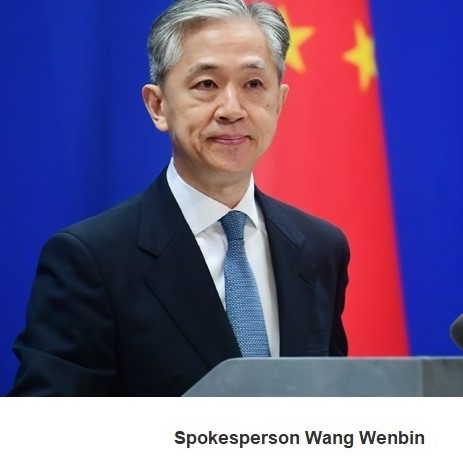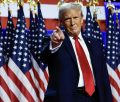China FO presser, Aug 10, 2022


hinese Foreign Ministry Spokesperson Wang Wenbin held a press conference on August 10, 2022 against the backdrop of tensions in the Taiwan Straits.
Yonhap News Agency: During the talks between the Chinese and ROK foreign ministers, on the THAAD issue, “the two sides underlined the need to take seriously each other’s security concerns and to strive to properly handle the issue”. The first stage of deployment of the THAAD system elements that have been shipped to the ROK has been completed. Could you elaborate on the meaning of “to take seriously each other’s security concerns” and “to properly handle the issue”? Do the two sides believe that the use of the THAAD system currently deployed in the ROK should be limited?
Wang Wenbin: First let me share with you some details about the talks between the two foreign ministers. State Councilor and Foreign Minister Wang Yi held long talks with visiting ROK Foreign Minister Park Jin yesterday in Qingdao. They held in-depth exchanges of views on bilateral relations and issues of mutual interest and reached important common understandings. We have released the readouts on the talks. We believe this was a constructive and productive meeting.
As to the issue of the Terminal High Altitude Area Defense (THAAD) system that you asked about, I would like to point out that the US’s deployment of THAAD anti-missile system in the ROK clearly undermines China’s strategic security interest. China has made clear its concern to the ROK side on multiple occasions.. Based on the understanding between the two sides, China and the ROK were able to properly handle the THAAD issue. During yesterday’s meeting between the two foreign ministers, the two sides once again had an in-depth exchange of views on the THAAD issue, elaborated on their respective positions, and deepened mutual understanding. Both agreed to take each other’s legitimate concerns seriously and continue to prudently handle and properly manage this issue to make sure it does not become a stumbling block to the sound and steady growth of bilateral relations.
Bloomberg: Still on the South Korea topic. I noticed that the Foreign Ministry issued a statement regarding the floods in Seoul in the past couple of days. There are reports that two Chinese nationals were among those who died during the floods. Can you confirm that and do you have any more information about the Chinese nationals who died during the floods in Seoul?
Wang Wenbin: During his talks with ROK Foreign Minister Park Jin yesterday, State Councilor and Foreign Minister Wang Yi expressed sympathy to the ROK side over the casualties caused by the heavy rain disaster in the ROK’s capital region. Foreign Minister Park Jin thanked him for that.?
Two Chinese nationals lost their lives in the floods. Upon learning that, the Chinese Embassy in the ROK immediately contacted local government authorities to seek confirmation and information on what?happened, and contacted the families of the victims to offer condolences and assistance with follow-up matters. At the same time, the Department of Consular Affairs of China’s Ministry of Foreign Affairs and the Chinese Embassy in the ROK also released consular notices to remind Chinese personnel, institutions and enterprises in the ROK to take precautions against secondary hazards associated with the heavy rainfall to stay safe. For those in need of emergency assistance, please contact the Chinese Embassy in the ROK.
Xinhua News Agency: The Xinhua News Agency yesterday released a report titled The US’ Practice of Forced Labor at Home and Abroad: Truth and Facts. Do you have anything to say on that?
Wang Wenbin: This report provides a multi-dimensional account of the historical facts and reality of forced labor in the US over the past two centuries and more since the founding of the US, which deserves people’s attention. I’d like to take this opportunity to share some of the main points in the report with you.
First, forced labor in the US was born and grew with the founding of the nation and its primitive accumulation of capital. Slave trade was an original sin of the US. The blood and tears of the millions of black slaves and the bones of the hundreds of thousands of Chinese laborers are unmistakable evidence of forced labor in the history of the US.
Second, the US has a horrible track record of forced labor. At least 500,000 people in the US are living under modern slavery. Forced labor is rampant in US prisons. Private prisons in the US have colluded with greedy politicians to force prisoners to work, essentially creating slave labor in prison. Forced labor in the US is pervasive in sectors including agricultural planting, domestic services, catering, tourism and medical service, and forced labor among children and women are particularly abhorring.
Third, the spill over effect of the egregious impact of forced labor in the US has caused serious transnational human trafficking and human rights violations in other countries. The US is a source, transit hub, and destination country for victims of forced labor and slavery. Up to 100,000 people are trafficked to the US annually and fall victim to forced labor. Multiple transnational companies in the US have long engaged in forced labor overseas in violation of the human rights in other countries.?
Fourth, the international community has long been seriously concerned about forced labor in the US. The Committee of Experts on the Application of Conventions and Recommendations (CEACR) and the UN Special Rapporteur on Trafficking in Persons have repeatedly questioned and criticized the US. However, the US has chosen to be oblivious to this and even wantonly smeared other countries by falsely accusing them of “forced labor”. Anyone who knows the facts can easily see through the US’s double standard and hypocrisy and its lies about Xinjiang.?
Facts prove that the US, which has serious human rights problems such as forced labor, is in no position whatsoever to lecture other countries on human rights, still less posing as a human rights judge and adopting unilateral and illegal sanctions. If the US truly cares about human rights, it should own up to and reflect on the forced labor issue at home and remedy its human rights deficit. It should stop lecturing other countries on human rights and stop creating forced labor, forced return to poverty and forced decoupling and disruption of industrial and supply chains in Xinjiang. It should also stop violating human rights, rules and laws in the name of upholding them.?
CCTV: Recently, US Secretary of State Antony Blinken and Special Presidential Envoy for Climate John Kerry both said that China’s decision to suspend bilateral climate talks with the US doesn’t punish the US — it punishes the world. What’s China’s comment?
Wang Wenbin: We have taken note of the relevant remarks of the US side. I would like to stress the following points:
First, the measure taken by the Chinese side is part of our legitimate and reasonable countermeasures against Pelosi’s visit to Taiwan. For quite some time, we have repeatedly stressed to the US side that the one-China principle is the political foundation on which China develops bilateral relations with other countries. In disregard of China’s strong opposition, Speaker Pelosi went ahead with the provocative visit to China’s Taiwan region, which seriously violated China’s sovereignty and territorial integrity. This visit took place with the US government’s connivance and support. The visit has undermined the political foundation of the China-US relations and will inevitably cause major disruption to the exchanges and cooperation between the two sides. China had made those points perfectly clear long beforehand. We said it and we mean it. The US has no reason to feel surprised.?
Second, due to the egregious impact of Pelosi’s visit to China’s Taiwan region, China has suspended its climate talks with the US. All consequences arising therefrom shall be borne by the US. As a responsible major country, China will continue to actively participate in international and multilateral cooperation on climate change. China is a country committed to real action, not just words on global climate governance. We have made a solemn pledge to strive to peak carbon dioxide emissions before 2030 and achieve carbon neutrality before 2060. We are endeavouring to formulate and implement a “1+N” policy framework for low-carbon development and green transition. China will staunchly pursue its carbon peak and carbon neutrality targets, actively participate in main-channel negotiations on climate change, provide other developing countries with support and help as our ability permits, and make our own contributions to tackling the global climate challenge.??
Third, the US side should earnestly shoulder its historical responsibilities and obligations on climate change. It is our consistent belief that to address climate change, it is not enough to just chant slogans without doing one’s part. Not long ago, the US Supreme Court decided that it would limit the US Environmental Protection Agency’s powers to curb greenhouse gas emissions. Besides, the US has been sanctioning and suppressing China’s solar companies citing the so-called Xinjiang-related issues as a pretext, which has dealt a direct blow to the atmosphere of our cooperation and the climate response of China and other countries. These self-contradictory moves make the world question the US’s capability and seriousness on addressing climate change. The US should earnestly deliver on its historical responsibilities and due obligations on climate change and stop looking around for excuses for its inaction.
Bloomberg: About China’s military drills around the island of Taiwan, can you confirm are they ongoing or have they already ended?
Wang Wenbin: As I have made clear, China’s military drills in the waters surrounding our own territory are justified, legitimate and lawful. They are a warning to the provocateurs, and a punishment for the “Taiwan independence” forces. I would refer you to the Chinese military for the specific question you raised.
Kyodo News: Today the Japanese Prime Minister Fumio Kishida reshuffled his cabinet. What expectation does China have for the new Japanese cabinet?
Wang Wenbin: We have noted relevant reports. The cabinet reshuffle is Japan’s internal affair. China attaches importance to China-Japan relations. We hope the new cabinet can work with the Chinese side in the same direction, and advance the bilateral relations along the right track for sound and steady development.
China Review News: According to reports, US House Speaker Nancy Pelosi questioned in an interview why her trip to Taiwan has received so much attention, while the visit of a group of US Senators to Taiwan several months earlier had no impact. She also said, “We cannot allow the Chinese government to isolate Taiwan”. What’s China’s comment?
Wang Wenbin: We have always opposed visits to Taiwan by members of the US Congress. Nancy Pelosi is the third highest-ranking political figure in the US. She travelled to Taiwan on a US military aircraft. While she was there, she repeatedly mentioned herself being there on behalf of the US and described the trip as an official visit. The DPP authorities touted the visit as a major breakthrough in Taiwan-US relations. All these show that Pelosi’s visit to Taiwan is a major political provocation that upgrades US-Taiwan exchanges. This goes against the US’s commitment of only maintaining unofficial relations with Taiwan in the Sino-US Joint Communiqué on the Establishment of Diplomatic Relations. This goes against the one-China principle, which is widely accepted by the international community and has been affirmed by UNGA Resolution 2758. This goes against the principle in international law of non-interference in other countries’ internal affairs, which is enshrined in the UN Charter.
Since four months, China?has?time?and?again made clear to the US through multiple channels and at various levels our stern position of firmly opposing Pelosi’s visit to the Taiwan region. However, the US has chosen to pursue the wrong course of action in disregard of China’s dissuasion and warnings. It is the US that has gone back on its commitment, not China. It is the US that has infringed on China’s sovereignty, not the other way round. It is the US that connives at and supports “Taiwan independence” separatist activities, not China conniving at and supporting separatist activities in the US. The US made the provocation first, and China has been compelled to take legitimate countermeasures, which are justified, lawful, necessary and proportionate.
The US has been going further down the path of fudging, hollowing out and distorting the one-China principle, and yet it accused China of changing the status quo. The US conducts more than one hundred military drills in waters around China on an annual basis, and yet it accused China of overreacting. This is gangster logic. China does not accept it, nor will the international community recognize it.
China will not hesitate to fight back each time the US makes a serious provocation that violates China’s sovereignty and interferes in China’s internal affairs. We will never allow our sovereignty and territorial integrity to be trampled and sabotaged.?
If the US truly hopes to adhere to international law and uphold all countries’ sovereignty and territorial integrity as it claims to, it should play no games but return to the one-China principle and the three Sino-US joint communiqués. The US must not act recklessly, and stop going further down on the doomed path. The US should give up the attempt to use Taiwan to contain China and do right things and take concrete steps to facilitate peace and stability across the Taiwan Strait.
Bloomberg: I’d like to ask about the US President Biden signing into law a competition bill that would include US$52 billion to boost America semiconductor research and development. Does the Chinese foreign ministry have any views on this new bill which has been signed into law?
Wang Wenbin: The Chinese competent authorities have already made our position clear on the relevant Act. The China Council for the Promotion of International Trade and China Chamber of International Commerce, among others, have also issued statements opposing the Act’s intervention in and restriction on economic, trade and investment cooperation of the global business community.
How to develop itself is the US’s own business, but the approach needs to be in line with WTO rules, consistent with the principle of openness, transparency and non-discrimination, and good for maintaining the security and stability of the global industrial and supply chains. It cannot set up barriers to normal economic and sci-tech exchange and cooperation between China and the US, still less undermine China’s legitimate development interests. China-US economic and sci-tech cooperation benefits the shared interests of both parties and contributes to the common development of humanity. Creating restrictions and decoupling would hurt others without benefiting oneself.
I want to stress that China puts the development of our country and nation on the basis of our own strength. No restriction or suppression will hold back China’s science and technological development and industrial progress.###
https://www.fmprc.gov.cn/mfa_eng/xwfw_665399/s2510_665401/2511_665403/202208/t20220810_10740034.html
-
Book Shelf
-
 Book Review
DESTINY OF A DYSFUNCTIONAL NUCLEAR STATE
Book Review
DESTINY OF A DYSFUNCTIONAL NUCLEAR STATE
- Book ReviewChina FO Presser Where is the fountainhead of jihad?
- Book ReviewNews Pak Syndrome bedevils Indo-Bangla ties
- Book Review Understanding Vedic Equality….: Book Review
- Book Review Buddhism Made Easy: Book Review
- Book ReviewNews Elegant Summary Of Krishnamurti’s teachings
- Book Review Review: Perspectives: The Timeless Way of Wisdom
- Book ReviewNews Rituals too a world of Rhythm
- Book Review Marx After Marxism
- Book Review John Updike’s Terrorist – a review
-
-
Recent Top Post
-
 CommentariesTop Story
India’s Migration Dilemma
CommentariesTop Story
India’s Migration Dilemma
-
 Commentaries
Crowd Management Blues
Commentaries
Crowd Management Blues
-
 Meher Baba SpeaksNews
Meher Baba Loved Them Too…
Meher Baba SpeaksNews
Meher Baba Loved Them Too…
- Commentaries Record Pentagon spending bill and America’s hidden nuclear rearmament
-
 CommentariesNews
Ides of trade between India and Pakistan
CommentariesNews
Ides of trade between India and Pakistan
-
 Commentaries
How sustainable is the rhetoric of India-China Bhai-Bhai
Commentaries
How sustainable is the rhetoric of India-China Bhai-Bhai
-
 CommentariesTop Story
New Set of Diplomatic Strains with Canada
CommentariesTop Story
New Set of Diplomatic Strains with Canada
-
 News
Ratan Tata’s Legacy
News
Ratan Tata’s Legacy
-
 Commentaries
India’s Strategic Push on the World Stage
Commentaries
India’s Strategic Push on the World Stage
- Commentaries Veils of Resistance
-
AdSense code
















